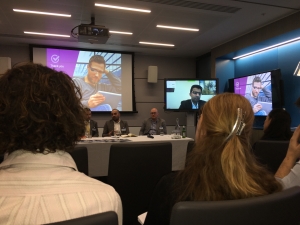This morning it was my pleasure to attend the Yorkshire Post Business Club at AQL in Leeds. The panel included Dr Adam Beaumont the CEO of AQL, Bob Monroe the CFO of Call Credit and Chris Spencer the CEO of EMIS Group. Chairing the Panel was Bernard Ginns, the Business Editor of the Yorkshire Post. All three panelists started by describing their journeys in scaling up tech businesses in the North of England.
 Adam Beaumont kicked off the session describing how his business started out life in Leeds. AQL started by offering secure mobile messaging and domain names to customers. They had been trading 16 years and didn’t want to go direct to the customer, instead they wanted to find a partner in order to scale. Adam mentioned how data security as a trusted entity is important to AQL. Originally all the infrastructure and equipment was based in London and the skills were based in Leeds. Adam’s choice was whether to move the skills to London or the infrastructure to Leeds. Luckily for Leeds, AQL chose the North, explaining the living standards are that much better and with excellent Universities on the door step there is lots of potential talent.
Adam Beaumont kicked off the session describing how his business started out life in Leeds. AQL started by offering secure mobile messaging and domain names to customers. They had been trading 16 years and didn’t want to go direct to the customer, instead they wanted to find a partner in order to scale. Adam mentioned how data security as a trusted entity is important to AQL. Originally all the infrastructure and equipment was based in London and the skills were based in Leeds. Adam’s choice was whether to move the skills to London or the infrastructure to Leeds. Luckily for Leeds, AQL chose the North, explaining the living standards are that much better and with excellent Universities on the door step there is lots of potential talent.
Sustainable skills in Leeds is important and Adam sees a skills gap and a potential opportunity in cyber security. Data is becoming more open and more sharable, and we need to safeguard it. In fact the government has just announced it will put £1.9bn into cyber security over the next few years. The links that local colleges provide for new talent will fill this skills gap, and ever increasing challenge in this field.
 Bob Monroe then went on to describe some of the history behind his company Call Credit, a credit rating agency spun out of the Skipton Building Society. Bob had spent the last 6 years at Reed Elsevier, running a unit dealing with health data on the south coast, and has now been in place as CFO for the last 7 months.
Bob Monroe then went on to describe some of the history behind his company Call Credit, a credit rating agency spun out of the Skipton Building Society. Bob had spent the last 6 years at Reed Elsevier, running a unit dealing with health data on the south coast, and has now been in place as CFO for the last 7 months.
48M adults have data held by Call Credit, and they describe themselves as a Big Data company. The heritage of Call Credit is that of financial services, but what has been driving the success of Call Credit?
Bob went on to describe how Call Credit had been a troubled teenager. Troublesome to their competitor as they were a disrupter in the market place. Originally Call Credit looked at credit decision making in-house for the Skipton Building Society, but the strong financial players in the Leeds city region allowed the business to spread it’s wings. Their first product was an affordability product, and the offering was then extended so that Call Credit could become a fully fledged credit agency. Software was then put on top of the data, and some of the software was data-agnostic, so would work with other people’s data.
All tech companies need identification software to know who they are dealing with, their age etc. Call Credit is now 2nd in the credit reference agency market and is growing beyond financial services into gaming, eCommerce, retail and other markets.
Bob explained how the difference in age changes people’s views on how happy you are to share data. Older people are still more cautious and tend to have paper shredders at home. Millennials, on the other hand, are much more relaxed in sharing their data.
Consumers need to know how their data is being held and used. £1 can be paid to get your data and find this out, but in the future the consumer will own their data. Call Credit is now a £150M business with 20% growth year on year. The business expects to double in the next 4 to 5 years.
Bob finished by describing what he sees as the three things needed to scale up a business:
- Technology: Business must refresh and invest in this
- You must be customer focussed
- People and culture is crucial
Call Credit have 300 techies and 750 people in their Leeds office. 64% of Call Credit staff are millennia’s and the average age in the company is 34. Call Credit need more data scientists and their Leeds site has the capacity to grow to up to 1,000 full time equivalents.
Third up was Chris Spencer of EMIS Group. Chris was born in Halifax and then moved to Barnsley before going to University in Leeds. Trained as a lawyer, Chris funded his studies as a nurse. It is therefore amusingly appropriate that Chris now leads a successful HealthTech business which started out life in Egton village in North Yorkshire. Two doctors started the business in Egton, thinking it would be a good idea to have an electronic patient record system as they could not read each others handwriting. At the time there was nothing else in the market, and the first product was launched with the name LV otherwise know as Launch Version. Chris was brought in to help build the business up as both doctors wanted to continue practicing in their doctor’s surgeries. The initial vision was to get the software into 50 practices.
Today EMIS software is in 54% of practice covering 5,000 establishments, and the 2nd player in the e-patient records market is TPP also based in Leeds. The software has now gone from the desktop to the cloud with EMIS Web and has expanded it’s reach to be used in pharmacies, A and E units and opticians.
Chris went onto state that people are getting older and are having to live with developing conditions. Cheaper care can be driven by getting the right data out of the systems. EMIS went through a management buy out in 2008 and then went on to be listed on AIM. The share price started at £3, and is now £10.50 giving business a market capitalisation of around £600M. EMIS turns over £150M with a net profit of £30M employing 2,000 members of staff.
Although AIM listed EMIS are proud to use local Northern providers for their legal and financial advise, PR and they are still with the Yorkshire Bank. EMIS are keen to partner with other tech companies in the city region.
The verdict from most of the business people at the breakfast event is that there is a technical skills shortage and that Leeds needs to build it’s brand as a one of the technical hubs for talent in the UK.
Webanywhere my company are encouraging the Iron Yard an American tech company which teaches students how to code to establish a presence in Leeds. Leeds City Council have been very proactive in connecting Daniel Luff of Apollo Eduction Group and the Iron Yard to tech businesses in Leeds. In addition we have steered the American company as to the best locations for setting up their coding bootcamp. I hope that initiatives such as the Iron Yard coupled with more collaboration from the likes of Webanywhere, AQL, EMIS Group and Call Credit will help make Leeds a digital destination for both students and businesses. Leeds can then make a real contribution to building the Northern Powerhouse as part of the new digital economy.


